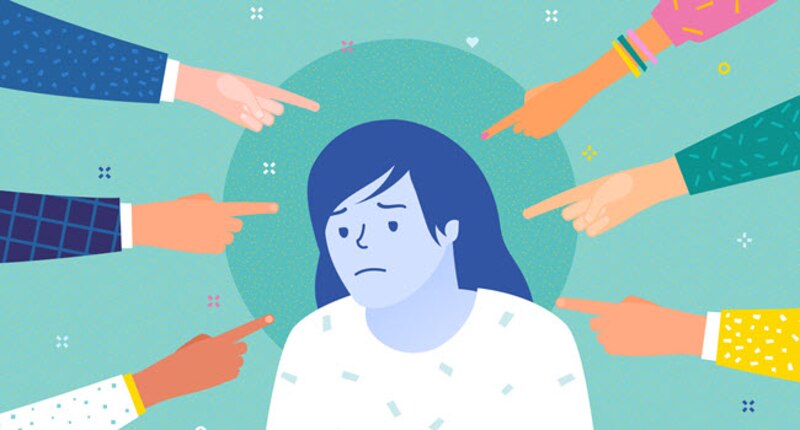Her eyes dodged quickly to her daughter’s slipping silk hijab, as she walked out of the doors of her high school. She could see the white flakes from the gel on her daughter’s edges and sideburns that stood outside of her hijab.
She noticed her daughter’s black and red hoodie draped perfectly at the top edge of her hijab, covering it from the outside world.
Her daughter’s eyes were on the ground, as she briskly walked past a group of exuberant teenage girls with long flowing hair and short crop tops. They appeared so happy, excited, and normal. However, Summer’s face was pale and emotionless, as she walked towards her mother’s car.
Summer is a young, seventeen-year-old first-generation American Muslim who attends public school in Atlanta, GA. Her parents raised her in this country and committed to sending her to Islamic school during the early years of her life.
As she grew older, the local Islamic school no longer met the academic needs of Summer and her parents decided to transition her into a local public high school for her remaining academic years.
Summer was experiencing an identity crisis, as her friends would constantly ask why she wore a hijab and why she couldn’t date. She would often feel so visible in the hallways of her school and even wondered if her teachers treated her differently.
She began to feel anxious each day, as she arrived at school. Her anxiety slipped rapidly into depression and she no longer felt any desire to remain strong in her faith. It was all becoming too much and she became increasingly quiet at home and less visibly Muslim at school.

Mental Health Crisis
Living in the digital age with constant news of political and global unrest, young Muslim youths are faced with navigating their emotions and thought patterns around being visibly Muslim in America.
Depression and anxiety may be two of the more common mental health issues faced by today’s Muslim youth.
According to the Pew Institute, a study of American Muslims between 18 and 25 years of age found that many members of this group may feel that their parents’ generation is out of touch with the cultural and social influences acting on American young adults.
“I honestly don’t know how to discuss my anxiety. It’s hard to explain. My mom doesn’t understand how it is for me at school. I feel like people are always staring at me, watching what I’m doing, and what I will say,” Summer (the last name kept anonymous) reluctantly spoke to AboutIslam.net.

Anxiety and Depression
According to the National Institute of Mental Health, around 15.7 million adults age 18 or older in the US have experienced at least one major depressive episode in the last year (6.7% of adults in the US).
It’s been estimated that 45 percent of people with one mental health condition meets the criteria for two or more disorders. One study found that half of the people with either anxiety or depression have the other condition (National Institute of Mental Health).
Depression includes feeling down, sad, or upset is normal. It can be concerning feeling that way for several days or weeks on end.
Anxiety, or fear and worry, can happen to anyone from time to time, too. It’s not unusual to experience anxiety before a big event or important decision, however, chronic anxiety can be life-altering and can have a direct impact on a person’s daily life, (National Institute of Mental Health).
“I never knew my daughter had anxiety until her teacher mentioned it to me. I immediately asked her and she couldn’t explain it to me either,” Laila (Summer’s mom) told AboutIslam.net.
“I noticed she would overthink everything and began to take longer to get ready each day before school. I didn’t know she was having anxious thoughts surrounding her hijab. It’s something I’m honestly learning about each day.”
Addressing Mental Health for Muslim Youth
As the need for mental health services rises, community organizations are stepping up to the plate to raise awareness and provide mental services for Muslim youth. Organizations such as the Khalil Center, MACE, and Naseeha.org are providing safe spaces for our youth.
- Khalil Center (https://khalilcenter.com)
The Khalil Center, which is based out of Chicago offers spiritually integrated tele-mental health therapy. Muslim mental health professionals video chat with people in need.
- Naseeha.org (https://naseeha.org/)
Naseeha is a confidential, anonymous youth helpline for Muslim Youth in Canada and the United States.
- Muslim Advocates for Children with Exceptionalities (MACE) (www.wearemace.com)
MACE provides support services to empower children and adults living with disabilities and survivors of trauma to reach their full potential.
- AMALA (https://www.amalahopeline.com)
AMALA also offers confidential youth counseling with trained and culturally competent counselors.
Parents like Summer’s mom often struggle with how to make sense of the constant pressures facing their children. Many of us send our children off into the world with hopes that they’ll be able to navigate this ever-evolving climate. However, it is essential for us to look beyond the limitations of our own experiences to find real-time solutions that work for our youth.
Ultimately, we must seek the guidance and help of Allah to help us face out mental health challenges with wisdom and knowledge.